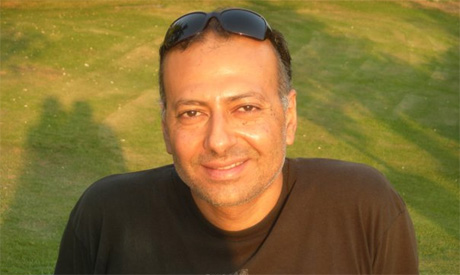Posted on Facebook on February 18, 2013
Words I delivered today in Samer Soliman’s memorial service at AUC.
Remembering Samer Soliman
Samer was the very essence of duty, compassion and hope.
During the ten short years I have known him, he was a beacon of inspiration, a sober, confident voice in times of distress and anxiety.
Way before the outbreak of the January Revolution, Samer was constantly writing about social justice, about religious tolerance and about the need for immediate reform.
He was a founding member of al-Bosla, one of the more incisive independent periodicals that offered a desperately needed voice of the democratic left. For five years, this journal turned out original articles by Sherif Younis, Hossam Tammam, Ziad al-Eliemi, Fayrouz Karawya, and Amr Ezzat, young thinkers and activists who would eventually be among the many leaders of the January Revolution. His own articles were an example of the best critical thinking that fused academia with activism: they were precise, original and profound. Together with his colleagues on the editorial board, Samer worked hard to produce a remarkable publication that played a significant role in paving the way for the January Revolution.
I followed Samer’s activities closely. When he finished his PhD dissertation at Science Po, we were all keen to see it in Arabic. With remarkable zeal, he sat down to translate it himself, and when eventually published as a book, it soon acquired its rightful place as one of the most perceptive critiques of the Mubarak regime. His newspaper articles were equally thought provocative and original, and during my long stay in New York, I would make sure to follow them as closely as I could.
I remember distinctly back in 2008 reading an article he had written about religious discrimination in Egypt. It was a sad article analyzing the rise in religious discrimination in the country. It was a depressing article, at the beginning, but in a characteristic manner, it was also hopeful. Samer was not naïve. He knew that religious bigotry was on the rise. But he also knew that sectarianism will never succeed in Egypt.
He believed that sectarianism, on the rise throughout Arab lands, will be defeated on the shores of the Nile. These were his words. His was not empty talk. He based his arguments on a close reading of reality and of history. He reminded us that the famous slogan “Religion is for God, while the homeland is for all”, that eternal slogan of the 1919 Revolution, did not come out of nothing. It was preceded by years of sectarian tension, by a Coptic Conference followed by a Muslim one in 1911, but that Egyptians, believing in the common good, decided to work together rather than against each other.
It was this conviction that religious bigotry is a scourge that had no place in Egypt that propelled him to found MARED, Egyptians Against Religious Discrimination. Against fierce official opposition, he managed to register the association and to launch its first annual conference in 2008. Logically, he thought that the Press Syndicate, the so-called bastion of free speech in Egypt, would be the best place to have his well-prepared conference. But then some bigoted journalists got wind of the fact that the conference had invited a Baha’i woman to speak. They objected to this saying that the Syndicate would be defiled by the presence of a Baha’i on its premises, and insisted to drop this Baha’i speaker from the program as a condition for holding the conference in that venue. Samer, true to his principles, would not hear of this and thought that there is no point in having a conference about religious discrimination in which a Baha’i is discriminated against. Through heroic efforts in the eleventh hour, he managed to shift the venue to the Tagammu’ Party. And it was a huge success.
I was following this news from New York where I was living at the time. And the minute I heard about the success of the conference—the mere fact that it was held was a success—I phoned him to offer my congratulations. We had a lengthy conversation, I remember well, for he seized the opportunity to insist that I write something about this episode in al-Badeel Newspaper, whose op-ed page he ran. I told him that it would be an honor, but that I was too busy with my academic work to afford the time. He responded by saying that he too had an academic job, but that there was work to be done. Embarrassed, I accepted to write a piece. But then he said, “A piece? I thought you agreed to write regularly.” “Did I?” I responded. But then after a moment’s thinking, I said, “OK, Samer, علشان خاطرك. For your sake.” “For Egypt’s sake,” he responded, “not mine.”
Samer had deep confidence and hope in Egypt. His was an instinctive hope, not needing any validation or proof. If pressed, he could provide sophisticated, academic arguments for why Egypt will prevail. But it was mostly his deep, sincere belief in the good that is Egypt and in the goodness of Egyptians that saw him through. His hope was contagious.
Today is our chance to thank Samer for the way he inspired us, even though he was taken from us so young, when there was so much more that he could still give. During these tense times when we face so many difficulties, his absence is a blow most terrible to bear. And yet we look at his indefatigable energy, his optimism and his hope to help us through.
